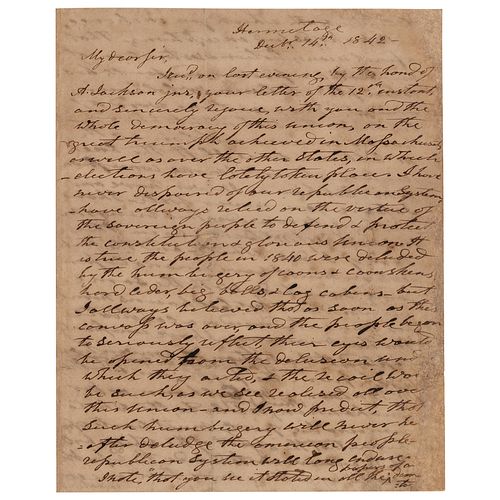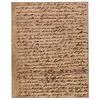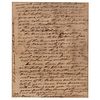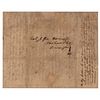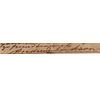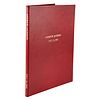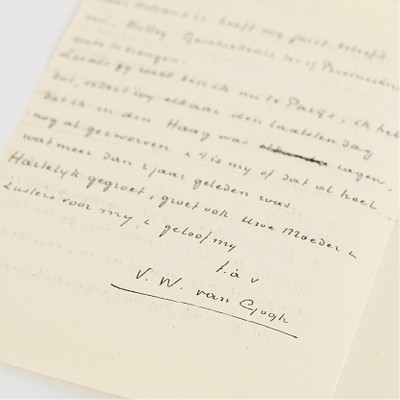Andrew Jackson Autograph Letter Signed
Two ways to bid:
- Leave a max absentee bid and the platform will bid on your behalf up to your maximum bid during the live auction.
- Bid live during the auction and your bids will be submitted real-time to the auctioneer.
Bid Increments
| Price | Bid Increment |
|---|---|
| $0 | $5 |
| $50 | $10 |
| $200 | $25 |
| $500 | $50 |
About Auction
Jun 15, 2022
RR Auction's June Fine Autograph and Artifact sale brings over 800 extraordinary items to the auction block, including: a four-page musical manuscript by Wolfgang Amadeus Mozart, containing four canons and an early autograph letter signed by the celebrated painter Vincent van Gogh. RR Auction support@rrauction.com
- Lot Description
ALS, four pages on two adjoining sheets, 7.75 x 9.5, December 14, 1842. Handwritten letter to J. George Harris, editor of the Nashville Union, expressing his delight with the result of the 1842 midterm elections, criticizing the propaganda associated with the 1840 presidential campaign, and denying the claims of Democratic newspapers that he and his former vice president, John C. Calhoun, had reconciled.
In part: "I‰Û_sincerely rejoice with you and the whole democracy of this union, on the great triumph achieved in Massachusetts, as well as over the other states, in which elections have lately taken place. I have never despaired of our republican system-have allways relied on the virtue of the sovereign people to defend & protect the Constitution & glorious Union. It is true the people in 1840 were deluded by the humbuggery of coons & coonskins, hard cider, big balls, & log cabins, but I allways believed that as soon as this canvass was over, and the people began to seriously reflect, their eyes would be opened from delusion under which they acted, & the recoil would be such, as we see realized all over this union-and I now predict, that such humbuggery will never he[re]after deludge the American people-[the] republican system will long endure.
I note 'that you will see it stated in all the papers of a dem. character with which you exchange, with perhaps few exceptions, that a final reconciliation & restoration of mutual confidence and faith has taken place between Mr. Calhoun & myself.' There is not one word of truth in the statement. I have had no communication with Mr. Calhoun since I left the Executive chair-& I make [no] concessions to Mr. Calhoun-I never have and I assure you never will-I have nothing to concede. This brings me in mind of Mr. [John] Bell & Co., in the case of Judge [Hugh Lawson] White and the publication must have emanated from some busybody with the same views. When Mr. Calhoun's name has been introduced as a candidate for the presidency, I have uniformly replied that a national convention fresh from the people must decide upon the candidate; and whether that be Mr. Van Buren, Mr. Calhoun, or Mr. Buchannan which may be selected, the whole Democratic Party must unite upon him-that the object of the Whiggs will be to endeavour to divide the republi[can] ranks, by getting more than one candidate into the field, like Bell with Judge White, to divide and conquer‰Û_Should Mr. Calhoun be selected by the Democratic Peoples Convention to be holden, I as one of the Democrats would‰Û_support [the] candidate thus represented."
He adds a handwritten postscript on the address leaf, signed with his initials, "A. J.," in part: "My letter to Mr. Dawson is a concise view, of my real opinion of the constitutional powers of the states & Congress-he solicited the privilege to publish it, as he believed much good would result there from. Of course I could not withhold my assent." Professionally repaired and restored to near fine condition, with a small tear to the edge of the last page. Accompanied by a handsome custom-made finely bound full morocco leather case.
During the 1840 presidential campaign, the populist rhetoric of the Whig Party declared their candidate William H. Harrison to be 'the log cabin and hard cider candidate,' associating him with the rugged and simple life of common folk. Although Harrison had a privileged background and his Democratic opponent Martin Van Buren had a modest one, Harrison won both the electoral and the popular vote. Although the election gave the Whigs control of the presidency and Congress, Jackson's Democrats regained the majority in the House of Representatives after the 1842 midterm election discusses here.
John C. Calhoun had been vice president under Jackson, but a lasting rift divided the two men after the Petticoat Affair (1829-31) and the Nullification Crisis (1832-33). When Calhoun's home state of South Carolina declared the federal Tariffs of 1828 and 1832 unconstitutional, and therefore null and void within the sovereign boundaries of the state, Calhoun defended the state's right to do so. Jackson, on the other hand, prepared to use military force to bring the state into compliance. Their relationship was never repaired.
In the postscript, he refers to a letter he had written to the editor of the Cincinnati Advertiser, Moses Dawson, one year earlier on December 16, 1841, outlining his views concerning the constitutional limits of Congress to produce currency: 'The sages who made our constitution, intended to guard us forever against a paper mon[e]y currency‰Û_[N]either the general government nor the states, have any constitutional power, to make a paper currency, neither thro corporations or by bills of credit.' A significant handwritten letter from Jackson with outstanding political content. - Shipping Info
-
Bidder is liable for shipping and handling and providing accurate information as to shipping or delivery locations and arranging for such. RR Auction is unable to combine purchases from other auctions or affiliates into one package for shipping purposes. Lots won will be shipped in a commercially reasonable time after payment in good funds for the merchandise and the shipping fees are received or credit extended, except when third-party shipment occurs. Bidder agrees that service and handling charges related to shipping items which are not pre-paid may be charged to a credit card on file with RR Auction. Successful international Bidders shall provide written shipping instructions, including specified Customs declarations, to RR Auction for any lots to be delivered outside of the United States. NOTE: Declaration value shall be the item’(s) hammer price and RR Auction shall use the correct harmonized code for the lot. Domestic Bidders on lots designated for third-party shipment must designate the common carrier, accept risk of loss, and prepay shipping costs.
-
- Buyer's Premium



 EUR
EUR CAD
CAD AUD
AUD GBP
GBP MXN
MXN HKD
HKD CNY
CNY MYR
MYR SEK
SEK SGD
SGD CHF
CHF THB
THB